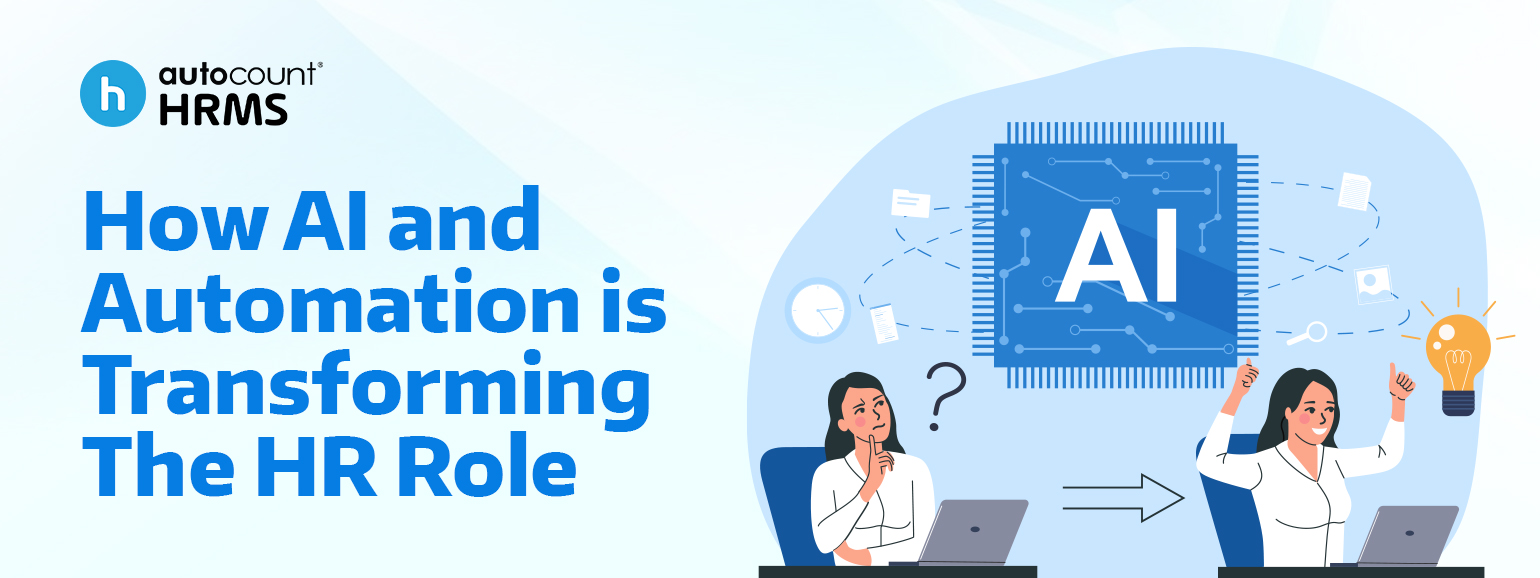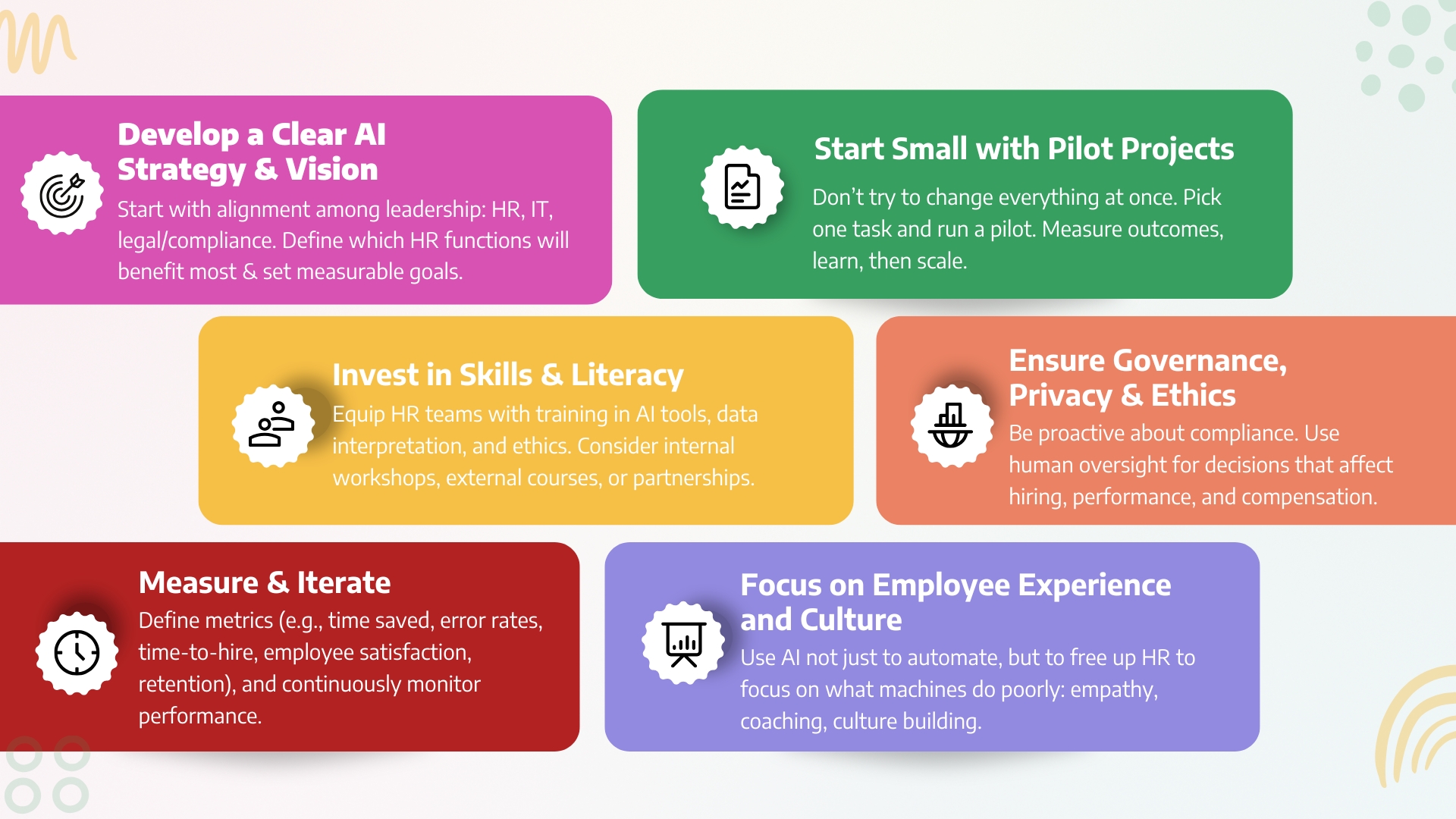
How AI and Automation is Transforming The HR Role
Human Resources (HR) is no longer just about payroll processing, attendance tracking, and hiring paperwork. In today’s fast-changing business landscape, HR is undergoing a profound transformation.
What was once a role focused on administrative execution is now evolving into a strategic partnership with the business, shaping company culture, employee experience, and even long-term growth strategies.
AI Software Adoption in Malaysia: Key Data & Trends
Recent research by labor economist Larry Katz highlights a significant trend: AI is quickly taking over repetitive, routine tasks. AI in HR now automates payroll calculations, updates compliance requirements, tracks attendance data, screens resumes, matches candidates to job openings, and more.
Instead of spending hours buried in spreadsheets and forms, HR teams can focus on employee engagement, culture building, and talent development. The result is higher efficiency and a more strategic contribution to business success.
High AI Usage Among Knowledge Workers
- 84% of Malaysian knowledge workers use AI at work (global average: 75%).
- 44% use generative AI tools monthly—higher than the global average of 39%.
- 83% of Malaysian workers bring their own AI tools to work.
Recruitment & HR Adoption Rates
- 17% of employers currently use AI in recruitment (mainly resume screening & shortlisting).
- 30% plan to explore AI tools in the next year.
- 39% have no current plans but acknowledge the trend is growing.
HR Software in Daily Operations
- 64% of employees use HR tech for payroll.
- 62% use it for leave management.
- Only 46% of HR professionals believe they are equipped with the required AI skills to succeed in their roles in the next 3‐5 years.
Government & National Initiatives
- A National AI Office has been set up to guide regulation and ethics.
- Microsoft has invested USD 2.2 billion in Malaysia’s AI infrastructure and skilling.
Case Studies: Malaysian HR + AI in Action
With AI streamlining both recruitment and payroll processes, employers make faster and more informed decisions. Meanwhile, AI-powered chatbots support both candidates and employees around the clock, ultimately enhancing the overall experience while reducing HR’s administrative burden.
Here are some examples showing how HR is already making use of AI software / technology in practical ways:
- CelcomDigi & UMW Corporation: Implements GenAI / AI tools in HR workflows, particularly in skills-gap analyses, performance monitoring, and employee upskilling.
- Khazanah Nasional Berhad: A government / public-sector organisation doing a full digital transformation in its HR software to manage performance, expenses, workflows, and more.
How AI Software / AI Technology is Transforming HR Functions
AI is also shifting HR from being reactive to proactive. With predictive analytics, HR teams can identify employees at risk of leaving, evaluate training effectiveness, and forecast future workforce needs.
These insights transform HR reports into powerful decision-making tools for management, elevating HR’s influence at the strategic table.
| HR Functions | What AI / Automation Looks Like in Malaysia | Key Benefits |
|---|---|---|
|
Recruitment & Hiring |
Automated resume screening (shortlisting), candidate assessments, predictive candidate-job fit, chatbots for early Q&A / scheduling. Companies are using screening + predictive analysis to improve quality and reduce time. |
Faster hiring, cost savings, reducing manual bias; better candidate experience; helping SMEs compete better. |
|
Payroll / Leave / Basic Admin |
HR tech platforms used for payroll, leave management; digital-led platforms replacing manual / excel work; public sector pilot for freeing officer time. |
Reduced errors, less manual overhead, more time for strategic HR work. |
|
Performance Management / Employee Development |
Malaysian HR leaders consider performance management among top areas for AI impact; training & development also high priority. AI used to monitor performance, identify high-potential employees, and recommend learning paths. |
More targeted development, better retention, aligning skills with future needs. |
|
Predictive Analytics & Workforce Planning |
Less widespread yet, but growing. Use cases in predictive candidate fit; identifying who might leave; planning skills gaps. Government & large firms starting pilots. |
Helps avoid talent drain; more foresight into workforce needs; better budget & resource planning. |
|
Compliance & Ethics / Data Privacy |
Changes in PDPA (Personal Data Protection Act) and emerging AI ethical / regulatory frameworks. Organisations need to consider how data is used, bias, transparency. Government investment in AI regulation. |
Reducing legal risk; maintaining trust; ensuring fair, ethical AI use. |
Challenges & Barriers in Malaysia
However, it’s worth noting that AI is not perfect. Its knowledge depends on timely updates, so HR teams still need to validate information to ensure it reflects the latest regulations.
While there is momentum, there are real barriers that HR leaders in Malaysia need to be aware of:
- Skill & Readiness Gaps: Less than half of HR professionals feel ready to work with AI tools.
- Data Quality & Infrastructure Issues: Scattered or unstructured HR data reduces AI accuracy.
- Compliance & Privacy Risks: AI must align with Malaysia’s PDPA and future AI governance rules.
- Change Management Resistance: Employees may fear automation; HR must reassure and reskill.
What HR Professionals in Malaysia Should Do: Strategic Recommendations
AI and automation are not here to replace HR but to redefine it. They take over the manual, repetitive work and empower HR with data-driven insights, transforming HR from a purely administrative function into a true business partner.
Here's AutoCount's recommended best practices for HR teams in Malaysia (and similar APAC markets) to succeed with AI software / AI technology.

The future of HR will be a blend of technology and humanity. Using AI to boost efficiency and insights while focusing human energy on empathy, communication, and leadership. This is how HR will create healthier, more competitive workplaces in the years to come. Don't fall behind and get your own AI in HR as well.